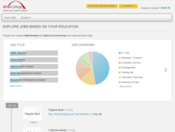Wesleyan's Secrets To Successful MOOCs
Wesleyan University polls students regularly and avoids flashy Hollywood techniques to ensure its massive open online courses are effective without breaking the budget.


10 Job Search Tools For Recent Grads
10 Job Search Tools For Recent Grads(click image for larger view and for slideshow)
At Wesleyan University, a private college in Middletown, Conn., "learning by doing" has been the approach to its first round of massive open online courses (MOOCs) with partner Coursera.
"Getting our feet wet makes us think more deeply about things," said Jolee West, director of academic computing services and digital library projects. "We're going to start from a different point from schools who've never mounted one."
The classes can be seen at Coursera.org/Wesleyan.
For instance, every university and college running a MOOC will need to figure out best practices for video, West said. Interestingly, Wesleyan does not believe Hollywood-style, high-production values make sense in every case, for every professor. West uses the example of having the instructor stand in front of a green screen for which a computer-generated background can be substituted later -- an essential technique for science fiction, but not necessarily education. "Rather than put everyone in front of a green screen, you want their personality to come through," she said. "That's what captures student attention."
[ For more on MOOCs, read Will MOOCs Massively Disrupt Higher Education? ]
West is part of a group working on surveys of students, which she hopes will shed light on what works and what can be improved.
"Next round, we'll have pre- and post-course surveys," she said, adding that this could help uncover what kinds of students stay in the course until the end.
David Baird, VP for information technology and CIO at Wesleyan, also is interested in using data.
Coursera has not yet shared with Wesleyan the data it has collected, including engagement metrics on how students are interacting with course material. "They haven't figured out how to show us the data," Baird said.
Another area of inquiry could be why students picked Wesleyan courses in the first place. "Consider this: we didn't really advertise we were doing this," Baird said. "People pored over the Coursera topics and they found us."
This might explain the higher-than-average 10% completion rate for Wesleyan's MOOCs, he speculated. One of the instructors is the school's own president, Michael Roth, who brought his course The Modern and the Postmodern to the Coursera platform. Roth has taught this course conventionally for decades.
"It's been really heady, the level of excitement and learning," Roth said about his 14-week course, which attracted 25,000 enrollments. "[25,000] sounds like a lot, but my colleague has 200,000 in his social psychology class," he said.
Not only was the diversity notable, with students from all over the world, Roth said the discussion-board exchanges were "great."
"The quality is just wonderful," he said, adding he also didn't anticipate so much camaraderie from people with such different backgrounds. Roth plans to reprise his Coursera MOOC this fall.
Switching hats to his administrative role, Roth said he doesn't believe MOOCs per se will have a disruptive impact on schools like Wesleyan.
He also rejected the argument that schools are pursuing MOOCs as a stealth approach to gutting their faculty ranks.
"I think technologies of education will be embraced insofar as [they] help people learn, certainly not because they make it cheaper to run an institution," Roth said. Roth added that Wesleyan's first round of Coursera classes, produced for around $15,000 apiece, have been well received.
"Some schools are spending 10 times that much, and I don't think their classes are any better," he said. Universities and colleges that prize the "subtle connections people make while learning -- and professors are a core dimension of that" -- will prosper and find ways to serve lifelong learners.
Roth said learning the possibilities of online education are important because these platforms will give institutions novel ways of providing classes, such as mixing online instruction into classroom experiences and giving students more flexibility to learn on campus or off campus.
But make no mistake: "We're going to double down on why the residential experience can be so powerful, even while experimenting with MOOCs," Roth said.
About the Author
You May Also Like






